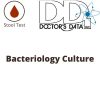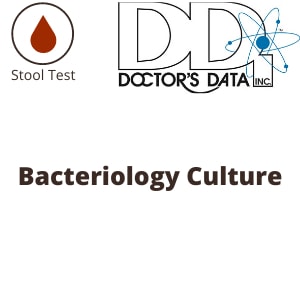Description
The Bacteriology Culture profile can identify the presence of beneficial flora, imbalanced flora including Clostridiumspecies, and dysbiotic flora, as well as detect infectious pathogens.
A good balance of beneficial microflora has been known to be associated with health benefits since the turn of the century. At that time Metchnikoff drew attention to the adverse effects of dysbiotic gut microflora on the host and suggested that ingestion of fermented milks ameliorated what he called "autointoxication." He proposed that the consumption of large quantities of Lactobacillus species would reduce the number of toxin-producing bacteria and result in better health and increased lifespan.
The mechanisms by which these benefits are derived are not yet fully understood. However, research suggests that some of the beneficial effects may be due to the following activities of beneficial bacteria:
- Release of substances antagonistic to enteropathogenic microorganisms such as:
lactocidin
lactobicillin and
acidolin
• Competition with pathogens for adhesion receptors
• Production of lactase
• Production of short chain fatty acids (SCFAs) such as butyrate, propionate, and acetate
In a healthy balanced state of intestinal flora, the beneficial bacteria make up a significant proportion of the total microflora. However, in many individuals, we see an imbalance of beneficial bacteria and an overgrowth of non-beneficial or even pathogenic microorganisms—dysbiosis. This can be due to a variety of factors including:
• Daily exposure to chemicals in our drinking water that is toxic to friendly bacteria
• The use of antibiotics
• Chronic consumption of highly processed foods (low in fiber, high in sugar)
• High-stress levels
Additional Special requests
At no additional charge, antimicrobial susceptibility testing to prescriptive and natural agents is also performed for appropriate bacterial species. Bacteriology Culture provides the clinician with important and specific clinical information to help plan an appropriate treatment protocol.
ANALYTES
The Bacteriology Culture profile can identify the presence of beneficial flora, imbalanced flora including Clostridiumspecies, and dysbiotic flora, as well as detect infectious pathogens.
A good balance of beneficial microflora has been known to be associated with health benefits since the turn of the century. At that time Metchnikoff drew attention to the adverse effects of dysbiotic gut microflora on the host and suggested that ingestion of fermented milks ameliorated what he called "autointoxication." He proposed that the consumption of large quantities of Lactobacillus species would reduce the number of toxin-producing bacteria and result in better health and increased lifespan.
The mechanisms by which these benefits are derived are not yet fully understood. However, research suggests that some of the beneficial effects may be due to the following activities of beneficial bacteria:
- Release of substances antagonistic to enteropathogenic microorganisms such as:
lactocidin
lactobicillin and
acidolin
• Competition with pathogens for adhesion receptors
• Production of lactase
• Production of short chain fatty acids (SCFAs) such as butyrate, propionate, and acetate
In a healthy balanced state of intestinal flora, the beneficial bacteria make up a significant proportion of the total microflora. However, in many individuals, we see an imbalance of beneficial bacteria and an overgrowth of non-beneficial or even pathogenic microorganisms—dysbiosis. This can be due to a variety of factors including:
• Daily exposure to chemicals in our drinking water that is toxic to friendly bacteria
• The use of antibiotics
• Chronic consumption of highly processed foods (low in fiber, high in sugar)
• High-stress levels
Additional Special requests
At no additional charge, antimicrobial susceptibility testing to prescriptive and natural agents is also performed for appropriate bacterial species. Bacteriology Culture provides the clinician with important and specific clinical information to help plan an appropriate treatment protocol.
Download Sample Report
The Bacteriology Culture profile can identify the presence of beneficial flora, imbalanced flora including Clostridiumspecies, and dysbiotic flora, as well as detect infectious pathogens.
A good balance of beneficial microflora has been known to be associated with health benefits since the turn of the century. At that time Metchnikoff drew attention to the adverse effects of dysbiotic gut microflora on the host and suggested that ingestion of fermented milks ameliorated what he called "autointoxication." He proposed that the consumption of large quantities of Lactobacillus species would reduce the number of toxin-producing bacteria and result in better health and increased lifespan.
The mechanisms by which these benefits are derived are not yet fully understood. However, research suggests that some of the beneficial effects may be due to the following activities of beneficial bacteria:
- Release of substances antagonistic to enteropathogenic microorganisms such as:
lactocidin
lactobicillin and
acidolin
• Competition with pathogens for adhesion receptors
• Production of lactase
• Production of short chain fatty acids (SCFAs) such as butyrate, propionate, and acetate
In a healthy balanced state of intestinal flora, the beneficial bacteria make up a significant proportion of the total microflora. However, in many individuals, we see an imbalance of beneficial bacteria and an overgrowth of non-beneficial or even pathogenic microorganisms—dysbiosis. This can be due to a variety of factors including:
• Daily exposure to chemicals in our drinking water that is toxic to friendly bacteria
• The use of antibiotics
• Chronic consumption of highly processed foods (low in fiber, high in sugar)
• High-stress levels
Additional Special requests
At no additional charge, antimicrobial susceptibility testing to prescriptive and natural agents is also performed for appropriate bacterial species. Bacteriology Culture provides the clinician with important and specific clinical information to help plan an appropriate treatment protocol.






John Anderson –
Having the experience with some online shops before decided to say “THANK YOU” to all personnel of this store. You are not only friendly, but deliver really good products in the shortest possible terms. In a word, I am absolutely happy with my purchase and the service. Everything was perfect!
Olivia Grosh –
I have experienced the fastest support ever. My order arrived on my door step the following day. Your team is always, friendly and very helpful. You managed to exceed my expectations!
Alan Smith –
Made a purchase at your store recently. The order has been shipped and delivered on time. The quality is superb! The price is quite reasonable. Told all my friends about your excellent service and the variety of choice. I think I’ll be your loyal customer in future as well. I wish your store many more years of prosperity.